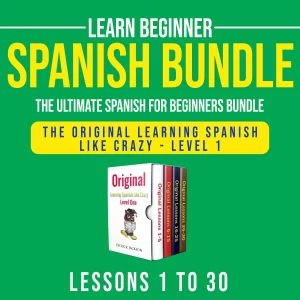Subject and Prepositional Pronouns
First things first: pronouns take the place of a noun. Instead of saying,
Ana is my friend. Ana lives in my neighborhood. I often go out with Ana on weekends.
replace one of the nouns with a pronoun:
Ana is my friend. She lives in my neighborhood. I often go out with her on weekends.
Notice that two words were used to replace Ana: she and her. In English, we use subject pronouns (I, you, he, she, it, we, they) if the pronoun is the subject of the sentence or the “do-er” of the action. We use object pronouns (me, you, him, her, it, us, them) after a preposition, or if the pronoun is the direct or indirect object of the sentence. (Notice that you and it are both subject and object pronouns in English.)
Bearing in mind what you already know about subjects and objects in English, we’ll switch now to Spanish. In Spanish, the same words are used for subject pronouns and prepositional pronouns (pronouns used as the object of a preposition), with two exceptions that we’ll explore in a moment. (Be careful! Direct and indirect object pronouns are very different from subject pronouns in Spanish—so different that they’ll require a lesson all their own.) The sentences about Ana would read like this in Spanish:
Ana es mi amiga. Ella vive en mi pueblo.[1] Muchas veces yo salgo con ella los fines de semana.
Keeping this in mind, let’s examine subject and prepositional pronouns.
|
Subject Pronouns |
Prepositional Pronouns |
||
| English | Español | English | Español |
| I | yo | me | mí |
| you | tú, usted, ustedes | you | ti, usted, ustedes |
| he, it | él | him, it | él |
| she, it | ella | her, it | ella |
| we | nosotros/nosotras | us | nosotros/nosotras |
| they | ellos/ellas | them | ellos/ellas |
Several important differences should be obvious:
1) Why are there so many ways to say you?
2) Why is it on the same line as he and as she?
3) Why are there –os and –as endings for some of the words?
We’ll begin with the second question. All nouns in Spanish are considered masculine or feminine, even inanimate objects. Nouns with el are masculine: el barco, el zapato, el libro. Nouns with la are feminine: la computadora, la camisa, la bandera. When using a pronoun to replace a masculine noun, use él; to replace a feminine noun, use ella. Observe:
I love this shirt. It is so pretty.
Me encanta esta camisa. Ella es muy bonita.
It should be noted here that pronouns are often omitted in Spanish. Since the verb forms are so specific, pronouns almost seem redundant. In the previous example, most Spanish speakers would omit the pronoun:
Me encanta esta camisa. Es muy bonita.
It is understood that bonita refers to the camisa in the previous sentence.
The third question is related to the second in that it also deals with masculine and feminine pronouns. Use nosotras or ellas if all of the people or items in question are feminine; use nosotros or ellos for all-masculine or mixed groups.
They are my sisters.
Ellas son mis hermanas.
Now for the first question: why are there so many ways to say you? Unlike modern English, in Spanish there are formal and informal systems of address. Use tú to address relatives, friends, and children. Use usted (abbreviated as Ud. or sometimes V. or Vd.) to address older people, people you do not know well, or anyone to whom you wish to show respect. (In families, the level of formality varies. In some families, grandchildren would never use the usted form with Abuelita; in others, children would never use the tú form with Padre.) When addressing a group of people, formally or informally, use ustedes (Uds. or sometimes VV., Vs. or Vds.).
Some final notes about the prepositional pronouns mí and ti:
1) Mí is written with an accent mark to distinguish it from the possessive pronoun mi (my).
2) When used with the preposition con (with), mí and ti become the compound words conmigo and contigo.
Voy al comercio central—¿quieres ir conmigo?
Contigo no, a ti te gusta perder todo el día allá.
(Translations for these two sentences are in the answer section—consider them
extra credit!)
3) Mí and ti are the only two prepositional pronouns that are different from their subject pronoun counterparts.
Practice
If you were speaking to these people, would you use tú or usted?
1) your daughter
2) your daughter’s teacher
3) your boss
4) an elderly woman at the supermarket
5) your best friend
Fill in the blanks with the pronoun in parentheses:
6) (She) ___________________ es mi mejor amiga.
7) (We) ___________________ hemos sido amigos por muchos años.
8) Siempre paso con ___________________ (her).
9) Sus hijos me respetan cuando salgo con ____________________ (them).
10) Su esposo es muy buen hombre. (He) _____________________ cuida de la familia.
[1] Barrio, the usual translation for neighborhood, carries a negative connotation for many Spanish speakers. In some areas, urbanización (development), zono or distrito are more appropriate.
Answers:
1) tú 6) Ella
2) usted 7) Nosotros
3) usted 8) ella
4) usted 9) ellos
5) tú 10) Él
Click here to go to Archives of Spanish Grammar topics
We hope that you enjoyed this online Spanish class. You can learn more about
How to speak Spanish or How to Learn Spanish with our Learning Spanish course by clicking here.





